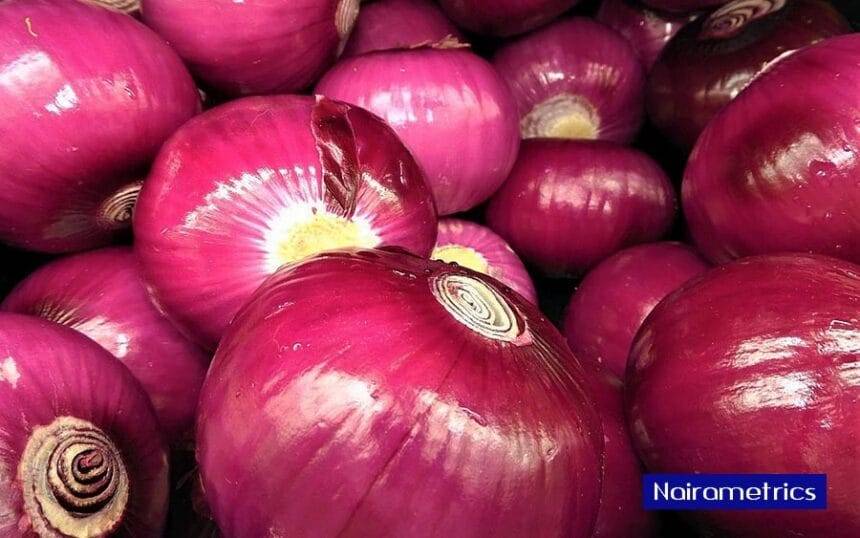Main Points In Hindi (मुख्य बातें – हिंदी में)
-
उच्च उत्पादन लागत और उसके प्रभाव: नेशनल ओनियन प्रोड्यूसर्स, प्रोसेसर्स एंड मार्केटर्स एसोसिएशन ऑफ नाइजीरिया (एनओपीपीएमएएन) के अध्यक्ष अल्हाजी अलियू मैतासामु ने बताया कि प्याज की खेती की लागत में वृद्धि के कारण किसानों की उत्पादन क्षमता कम हो रही है, जिससे खाद्य सुरक्षा पर खतरा मंडरा रहा है।
-
कटाई के बाद की हानि: नाइजीरिया में प्याज उत्पादन का 50% से अधिक कटाई के बाद बर्बाद होता है, जो कि अपर्याप्त भंडारण, अविश्वसनीय परिवहन, और सीमित संरक्षण तकनीक के कारण है। यह स्थिति किसानों की आय को प्रभावित करती है और व्यापक अर्थव्यवस्था को नुकसान पहुँचाती है।
-
जलवायु परिवर्तन के प्रभाव: जलवायु परिवर्तन के कारण अप्रत्याशित मौसम पैटर्न और अधिक वर्षा के मौसम ने प्याज उगाने के पारंपरिक चक्र को बाधित किया है, जिससे फसल की बीमारियाँ, जलभराव, और उपज में कमी आई है।
-
वित्तीय तनाव: बढ़ती मुद्रास्फीति और कृषि इनपुट की कीमतों में वृद्धि ने किसानों के लिए अपने परिचालन को बनाए रखना कठिन बना दिया है, जिससे वे नई प्रौद्योगिकियों में निवेश करने से हतोत्साहित हो रहे हैं।
- समर्थन की आवश्यकता: मैतासामु ने सरकार, वित्तीय संस्थानों, और निजी क्षेत्र के हितधारकों से प्याज उद्योग का समर्थन करने के लिए नीतिगत पहल और वित्तीय सहायता की अपील की है, ताकि किसानों की आजीविका और नाइजीरिया की खाद्य आपूर्ति को स्थिर किया जा सके।
Main Points In English(मुख्य बातें – अंग्रेज़ी में)
Here are the main points of the provided text about the challenges faced by onion producers in Nigeria:
-
Post-Harvest Losses: The National Onion Producers, Processors and Marketers Association of Nigeria (NOPPMAN) revealed that over 50% of onion production is lost after harvesting due to limited preservation techniques, unreliable transportation, and inadequate storage facilities.
-
Rising Production Costs: The cost of onion farming has skyrocketed due to increasing prices of seedlings and other essential agricultural inputs, making it difficult for farmers to maintain their production capacity and threatening food security in the country.
-
Economic Strain on Farmers: Inflation has significantly affected onion farmers, with rising costs of fertilizers, pesticides, fuel, and labor. Many farmers are struggling to keep their operations running, making it challenging for them to invest in new technologies or expand their operations.
-
Impact of Climate Change: Climate change has introduced unpredictable weather patterns and prolonged rainy seasons, disrupting traditional onion cultivation cycles. This results in crop diseases and poor yields, undermining the industry’s stability.
- Call for Support and Policy Action: The NOPPMAN president urged government, development partners, financial institutions, and private sector stakeholders to provide policy initiatives and financial support to safeguard farmers’ livelihoods and stabilize Nigeria’s food supply.


Complete News In Hindi(पूरी खबर – हिंदी में)
नेशनल ओनियन प्रोड्यूसर्स, प्रोसेसर्स एंड मार्केटर्स एसोसिएशन ऑफ नाइजीरिया (एनओपीपीएमएएन) ने खुलासा किया है कि उच्च उत्पादन लागत, जलवायु चुनौतियों और खराब भंडारण बुनियादी ढांचे के कारण किसानों को फसल कटाई के बाद 50% से अधिक नुकसान का सामना करना पड़ रहा है।
एनओपीपीएमएएन और पश्चिम और मध्य अफ्रीका में प्याज क्षेत्र की क्षेत्रीय वेधशाला (आरओओ/डब्ल्यूसीए) दोनों के अध्यक्ष अल्हाजी अलियू मैतासामु ने सोकोतो में एक हालिया प्रेस कॉन्फ्रेंस में इन चिंताओं को बताया।
मैतासामु के अनुसार, पौध और अन्य आवश्यक कृषि आदानों की कीमतों में वृद्धि के कारण प्याज की खेती की लागत आसमान छू गई है।
“हाल के महीनों में, प्याज की पौध की लागत अभूतपूर्व स्तर तक बढ़ गई है, जिससे हमारी उत्पादन क्षमता पर भारी असर पड़ा है। यदि किसान खेती नहीं कर सकते, तो हमारा उत्पादन घट जाएगा, कीमतें बढ़ जाएंगी और अंततः, पूरे देश में खाद्य सुरक्षा खतरे में पड़ जाएगी।” मैतासामु ने कहा।
उन्होंने चेतावनी दी कि यह बढ़ती लागत खाद्य सुरक्षा के लिए खतरा पैदा करती है क्योंकि वे किसानों को पिछले स्तर पर खेती करने से हतोत्साहित करते हैं और इन चुनौतियों को कम करने के लिए त्वरित कार्रवाई का आग्रह करते हैं।
कटाई के बाद की अवस्था में हानि
- एसोसिएशन ने बताया कि सीमित संरक्षण तकनीक, अविश्वसनीय परिवहन और अपर्याप्त भंडारण सुविधाओं के कारण कटाई के बाद नाइजीरिया का आधे से अधिक प्याज उत्पादन नष्ट हो जाता है। मैतासामु ने व्यक्त किया कि यह पर्याप्त बर्बादी किसानों की आय को कम करती है और व्यापक अर्थव्यवस्था को प्रभावित करती है।
“इसका मतलब है कि अपर्याप्त भंडारण, सीमित संरक्षण तकनीक और अविश्वसनीय परिवहन के कारण फसल कटाई के बाद हमारा आधे से अधिक उत्पादन बर्बाद हो जाता है।” उन्होंने समझाया।
- मुद्रास्फीति प्याज किसानों के लिए विशेष रूप से हानिकारक रही है, उर्वरकों, कीटनाशकों, ईंधन और श्रम की बढ़ती लागत के कारण किसानों के लिए इससे उबरना चुनौतीपूर्ण हो गया है। मैतासामु ने कहा कि वित्तीय तनाव इतना गंभीर है कि कई किसानों को अपने परिचालन को चालू रखने के लिए संघर्ष करना पड़ता है, नई प्रौद्योगिकियों में विस्तार या निवेश करना तो दूर की बात है।
“यह वित्तीय तनाव किसानों की परिचालन को बनाए रखने की क्षमता को बाधित करता है और नई प्रौद्योगिकियों या विस्तार में निवेश को हतोत्साहित करता है,” उन्होंने समझाया।
- मैतासामु ने जलवायु परिवर्तन के प्रभाव की ओर भी इशारा किया, जिसके कारण अप्रत्याशित मौसम पैटर्न और लंबे समय तक बारिश का मौसम हुआ है। ये कारक पारंपरिक प्याज उगाने के चक्र को बाधित करते हैं और फसल की बीमारियों, जलभराव और खराब फसल की चपेट में आ जाते हैं।
“चूंकि हमारे किसान इन अप्रत्याशित परिस्थितियों से जूझ रहे हैं, इसलिए प्रभावी ढंग से योजना बनाने, रोपण करने और फसल काटने की उनकी क्षमता से समझौता हो गया है, जिससे पूरा उद्योग असुरक्षित हो गया है।” उन्होंने कहा।
मैतासामु ने सरकार, विकास भागीदारों, वित्तीय संस्थानों और निजी क्षेत्र के हितधारकों से नीतिगत पहल और वित्तीय सहायता के माध्यम से प्याज उद्योग में आगे आने और समर्थन करने का आग्रह किया।
उन्होंने किसानों की आजीविका की सुरक्षा और नाइजीरिया की खाद्य आपूर्ति को स्थिर करने के लिए एक समन्वित दृष्टिकोण की आवश्यकता पर जोर दिया।
Complete News In English(पूरी खबर – अंग्रेज़ी में)
The National Onion Producers, Processors and Marketers Association of Nigeria (NOPPMAN) has revealed that farmers are facing losses of over 50% after harvest due to high production costs, climate challenges, and poor storage infrastructure.
At a recent press conference in Sokoto, NOPPMAN and the Regional Observatory for the Onion Sector in West and Central Africa (ROO/WCA), led by Alhaji Aliyu Maitasamu, shared these concerns. Maitasamu stated that the rising costs of seedlings and other essential agricultural inputs have significantly increased the cost of onion farming.
He emphasized, “In recent months, the cost of onion seedlings has reached unprecedented levels, severely affecting our production capacity. If farmers cannot farm, our production will decline, prices will rise, and ultimately food security across the country will be at risk.”


He warned that these escalating costs threaten food security by discouraging farmers from farming at their previous levels, calling for urgent action to address these challenges.
### Post-Harvest Losses
– The association noted that over half of Nigeria’s onion production is lost after harvest due to limited preservation techniques, unreliable transportation, and inadequate storage facilities. Maitasamu explained that this significant waste reduces farmers’ incomes and impacts the overall economy.
He added, “This means that our post-harvest loss exceeds half of our production due to insufficient storage, limited preservation techniques, and unreliable transportation.”
– Inflation has particularly harmed onion farmers, making it difficult for them to recover due to rising costs of fertilizers, pesticides, fuel, and labor. Maitasamu pointed out that the financial strain is so intense that many farmers struggle to keep their operations running, let alone expand or invest in new technologies.
He stated, “This financial stress disrupts farmers’ ability to sustain their operations and discourages investment in new technologies or expansion.”
– Maitasamu also pointed to the impacts of climate change, which has resulted in unpredictable weather patterns and prolonged rainy seasons. These factors disrupt traditional onion growing cycles and expose crops to diseases, flooding, and poor yields.
He noted, “As our farmers grapple with these unpredictable conditions, their ability to plan, plant, and harvest effectively is compromised, putting the entire industry at risk.”
Maitasamu urged the government, development partners, financial institutions, and stakeholders in the private sector to step in and support the onion industry through policy initiatives and financial assistance.
He stressed the need for a coordinated approach to safeguard farmers’ livelihoods and stabilize Nigeria’s food supply.
For breaking news and market intelligence, follow us on our social media platforms.
Source link








